Table of Contents
If you're considering installing glass pool fencing for your backyard oasis, one of the first questions that may come to mind is: How much does it cost?
We will explore the various factors that can affect the cost of glass pool fencing, the average prices you can expect to pay, and any additional costs that may arise.
By the end of this guide, you'll have a clear understanding of what to budget for when investing in glass pool fencing for your home.
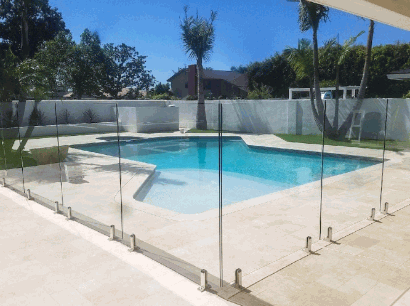
Glass pool fencing is a popular choice for swimming pool enclosures, primarily because it combines pool safety with visual charm, using high-quality tempered glass panels to create an unobtrusive barrier around your pool area.
Tempered glass, known for its durability and strength, ensures that the fencing is sturdy and reliable, providing a secure boundary without obstructing the view of the pool. The transparency of the glass allows for continuous supervision of swimmers while also letting natural light flow into the pool area, creating a bright and inviting atmosphere.
This type of fencing enhances the aesthetic appeal of the pool area, giving it a modern and sleek look that can complement various outdoor design styles. Its clean lines and elegant finish add a touch of sophistication to the overall appearance of the pool, making it a stylish feature of the outdoor space.
Explore in-depth: What Is The Best Fence
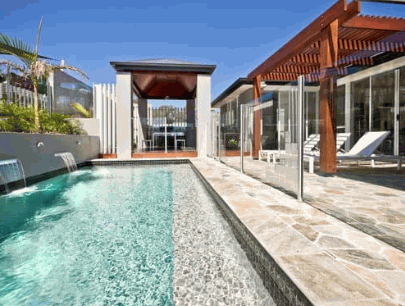
Choosing glass pool fencing offers several advantages, including compliance with safety regulations, enhanced aesthetic appeal, and robust durability, making it a preferred option for both residential and commercial pools.
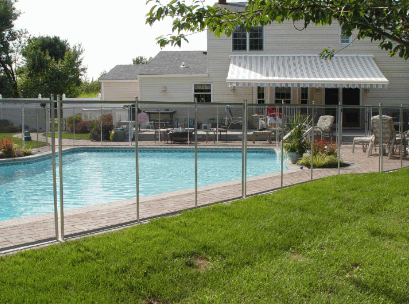
Glass pool fencing allows natural light to pass through, creating a safer environment for children and pets while enhancing the visual charm of your outdoor decor.
The transparency of glass pool fencing ensures that you can keep a watchful eye on your loved ones while they enjoy the pool, promoting a sense of security and peace of mind. The sleek and modern look of glass fencing adds a touch of sophistication to your outdoor space, increasing the overall appeal of your property. Its smooth surface is easy to clean and maintain, making it a practical choice for busy households.
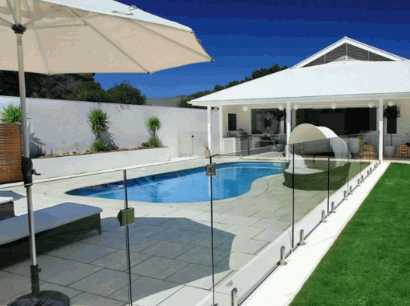
There are several types of glass pool fencing, including frameless, semi-frameless, and framed, each offering different levels of customization and aesthetic appeal.
Frameless glass pool fencing is known for its sleek and modern look, providing a seamless barrier around the pool area without any visible posts or frames. It offers maximum transparency and unobstructed views, perfect for enhancing the visual appeal of the pool area.
In contrast, semi-frameless glass pool fencing combines the elegance of glass with the added sturdiness of visible posts. This design offers a balance between aesthetics and functionality, providing a secure enclosure while still maintaining a contemporary look.
On the other hand, framed glass pool fencing features a traditional design with visible metal or wooden frames surrounding the glass panels. While it may not offer the same level of transparency as frameless or semi-frameless options, framed fencing provides additional structural support and can be customized with different frame styles to suit various architectural preferences.
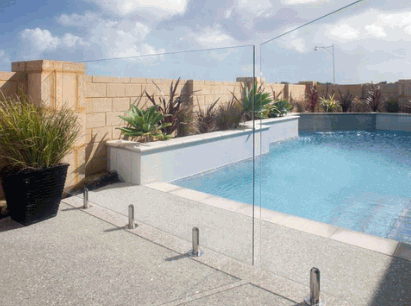
The cost of glass pool fencing can vary widely based on factors such as the type of glass used, the complexity of the installation, and whether you opt for high-end materials or seek a more budget-friendly solution.

Several factors can affect the cost of glass pool fencing, including the pricing of materials, labor costs, and the length of the fence measured in linear feet.
When considering the pricing of materials, the type of glass used plays a significant role. Higher quality, thicker glass will typically incur higher costs compared to thinner and standard-quality options. Labor rates also play a crucial part in determining the overall expense. Skilled labor for installation may come at a premium, especially if specialized techniques are required for the project.
The specific features of the installation site can also impact the pricing. Sites with challenging terrain, uneven ground, or unique landscaping features may require more labor and customization, thereby increasing the total cost of the glass pool fencing.

The average cost of glass pool fencing typically ranges from $100 to $600 per linear foot, depending on whether you choose low-end or high-end materials.
When opting for low-end materials, which are usually basic tempered glass panels, the cost per linear foot tends to fall on the lower end of the spectrum, ranging from $100 to $300.
On the other hand, if you prefer high-end options like premium frameless glass with specialized coatings or designs, you can expect to pay between $400 to $600 per linear foot.
It's important to note that the choice of material not only affects the pricing but also influences the overall aesthetics and durability of the glass pool fencing. While the initial investment may be higher for high-end options, they often offer enhanced features and a more sophisticated appearance, elevating the overall look and feel of your pool area.
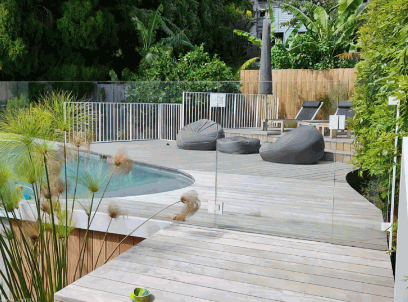
Plus the primary cost of materials and installation, additional costs for glass pool fencing can include permits, customization options, cleaning, repairs, and any necessary landscaping adjustments.
Permit fees are a common additional expense property owners may need to consider when installing glass pool fencing. These fees vary depending on the local regulations and can add to the overall project cost.
Maintenance expenses are another factor to take into account. Regular cleaning and upkeep of the glass panels are essential to ensure the longevity and aesthetics of the fence.
Customization options, such as frame design, gate styles, or special finishes, can also come at an extra cost. These enhancements can add a personalized touch but may increase the total budget for the project.
Landscaping adjustments, like leveling the ground or planting greenery around the fence, are often necessary to complement the elegant look of glass pool fencing, requiring additional investment.
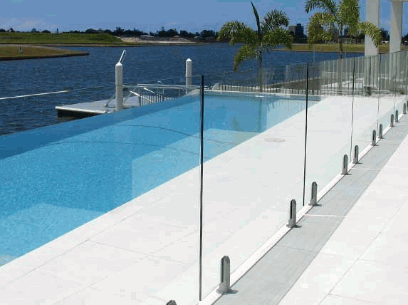
Choosing the right glass pool fencing involves considering factors such as compliance with pool safety regulations, security needs, and the specific preferences of property owners.

When choosing glass pool fencing, it's essential to consider features like durability, maintenance costs, and how the fencing will stand up to pool water and weather conditions.
One of the primary factors to keep in mind is the durability of the glass fencing. High-quality tempered glass is often preferred for its strength and ability to withstand impact. The maintenance requirements should not be overlooked.
Regular cleaning and proper care are necessary to keep the fencing looking its best and to prevent any damage. Ensuring that the glass is treated with protective coatings can also help in prolonging its lifespan.
Installing glass pool fencing can be a complex process that involves precise measurements and careful handling of materials, making it crucial to weigh the benefits of DIY installation versus hiring professional contractors to mitigate any installation risks.
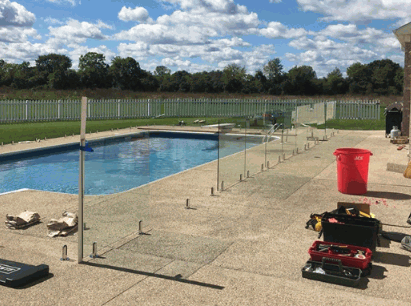
The steps for installing glass pool fencing include selecting the appropriate materials, measuring and marking the installation area, and securely installing the glass panels and hardware.
In terms of selecting the materials, precision is key. Ensure that you choose toughened glass panels that meet safety standards for the best durability and safety. Next, accurately measure the installation area to guarantee a perfect fit.
Before proceeding with the installation, mark the exact spots where the glass panels will be placed. This step is crucial to maintain symmetry and alignment throughout the fencing setup.
When securing the glass panels and hardware, make sure each component is tightly fastened. A secure installation is essential for the safety and longevity of the pool fencing.
Hiring professional contractors for glass pool fencing installation can help mitigate installation risks and ensure the job is done correctly, although it involves additional labor costs and an hourly rate.
When opting for professionals, you are investing in expertise that can address challenges effectively, improving the overall outcome. They bring years of experience, which translates into efficient workflows and high-quality results, enhancing the durability of your pool fence. Professional contractors are well-equipped with the necessary tools and resources, saving you the hassle of sourcing materials or equipment. The peace of mind that comes from knowing the job is in capable hands is invaluable, making the expenses worthwhile in the long run.
Maintaining glass pool fencing is relatively straightforward and involves regular cleaning to prevent buildup, prompt repairs to address any damage, and measures to ensure its long-term durability and low maintenance costs.

To maintain glass pool fencing, it is important to regularly clean the panels to remove any residue from pool water and weather conditions, as well as promptly perform repairs if any damage occurs.
When cleaning the glass panels, use a mild detergent or glass cleaner along with a soft cloth or sponge to avoid scratching the surface. Rinse off the cleaning solution thoroughly with clean water and dry the panels using a microfiber cloth to prevent water spots.
Addressing repairs promptly is crucial to prevent minor damage from escalating into more significant issues. Keep an eye out for any chips, cracks, or loose fittings, and seek professional assistance if needed.
Protecting the fencing from harsh weather conditions can be done by applying a weather-resistant sealant to the glass surfaces, which helps maintain their clarity and durability over time. Consider installing a canopy or awning to shield the fencing from direct sunlight and heavy rains.
In terms of pool water effects, regularly monitor the chemical balance of the pool to prevent corrosive substances from affecting the glass fencing. Installing a splash guard or barrier between the pool and the fencing can also help reduce water splashing onto the panels, minimizing the risk of damage.